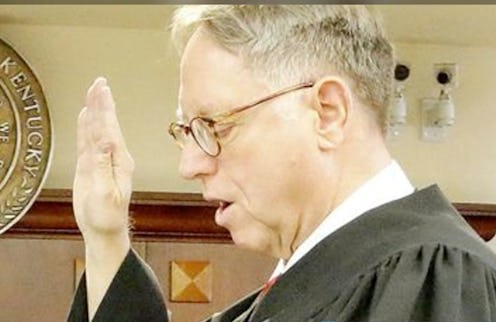News
A Kentucky Judge Who Wouldn't Hear A Same-Sex Adoption Case Has Resigned
The Kentucky Judicial Conduct Commission launched an investigation last spring into Judge W. Mitchell Nance's refusal to hear cases involving same-sex couples seeking to adopt children. Rather than fight the findings of the ethics commission, Nance has resigned, a decision made public on Wednesday.
The judge made headlines last spring when he wrote in an order that no "practicing homosexual" could "promote the best interests" of a child. Nance called his recusal from cases involving same-sex parents a "matter of conscience."
Jake Goodman, a founding member of Queer Rising, had an immediate response: "Good riddance."
The LGBTQ+ activist told Bustle:
Judge Nance exploited ethics rules by citing "conscientious objection" to deny gay parents the right to adopt their children. It's reprehensible, it's dehumanizing and — as groups like the ACLU and the Kentucky-based Fairness Campaign proved — it is unethical.
Nance was immediately a divisive figure, provoking searing criticism from civil rights groups like the ACLU that saw his "crisis of conscience" as a shield for discrimination. Legal director of the ACLU of Kentucky, William E. Sharp, said in May, "Judge Nance has disgraced himself, the office he holds and the state of Kentucky by perpetuating demonstrably false stereotypes about the fitness of LGBT individuals to be parents."
Some on the right had praised Nance as a beacon of religous liberty. Martin Cothran, a spokesman for The Family Foundation in Lexington, Kentucky, said in May: “If we are going to let liberal judges write their personal biases and prejudices into law, as we have done on issues of marriage and sexuality, then, in the interest of fairness, we are going to have to allow judges with different views to at least recuse themselves from such cases."
But part of the criticism directed at Nance came from the fact that he had ruled in same-sex adoption cases before seeking to recuse himself.
"Ethics rules were designed with the understanding that human beings, in any profession, develop prejudices in the course of their lives," Goodman told Bustle. "It is only reasonable to expect that judges will face 'crises of conscience' from time to time. When those situations arise, they should recuse themselves before denying people their rights, not after."
Sam Marcosson, a law professor at the University of Louisiana, is in agreement with Goodman. Calling for Nance's resignation, rather than simply recusal from same-sex adoption cases, Marcosson told the New York Times in May that, "He’s sent a message, an explicit message, that he’s biased about a whole range of issues that might come before him. ... If a judge simply cannot apply the law because of his or her personal views, it’s perfectly honorable for that judge to resign.”
This isn't the first time a judge has faced criticism on this issue. Ruth Neely, a magistrate in the small Wyoming town of Pinedale, received a censure from the state supreme court in March over her publicly stated refusal to carry out any same-sex marriages that came under her jurisdiction.
More pertinent to the moment, Alabama senate candidate Roy Moore was effectively removed of his judicial duties in September, after he sent an order to 68 probate judges instructing them not to issue same-sex marriage licenses. Moore responded by saying, "This was a politically motivated effort by radical homosexual and transgender groups to remove me as chief justice of the Supreme Court because of outspoken opposition to their immoral agenda."
Moore recently won the Republican primary to be the party's Senate candidate in a special election to fill Attorney General Jeff Sessions' vacated seat.
The LGBT community will no doubt welcome Nance's resignation as a victory, especially for same-sex couples looking to adopt children.
